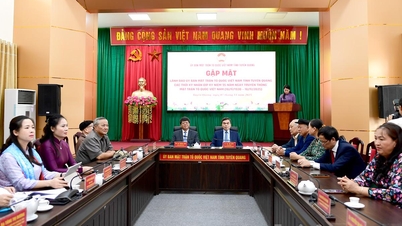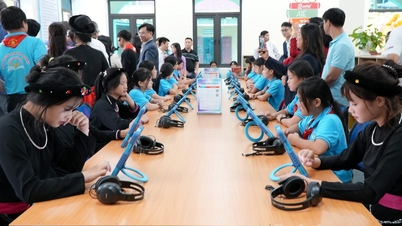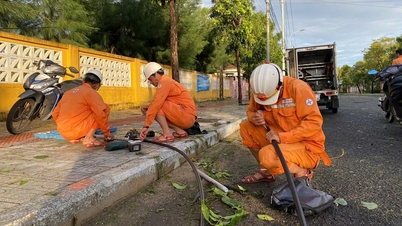Vietnam is one of the countries named by the Organization for Economic Cooperation and Development (OECD) at the Results Announcement Ceremony, recognized as a model in terms of survey participation rate and effectiveness.
The TALIS 2024 survey was developed by the OECD to provide internationally comparable evidence on secondary school teachers and principals, reflecting the characteristics, perspectives and professional experiences of teachers in the context of general education reform and digital transformation.
Continuing the 2018 cycle, Vietnam continues to participate with a nationally representative sample of 202 educational institutions in 58 provinces and cities, 202 principals and 4,410 teachers. The entire process is carried out on computers according to strict technical and security standards of the OECD, ensuring objective and reliable results.
The digital transformation capacity of Vietnamese teachers is a "bright spot"
TALIS 2024 results show that Vietnamese teachers have an average age of 42 years, lower than the OECD average of 45 years; 70% are female and 91% have long-term contracts. The Vietnamese teaching staff is assessed as young, enthusiastic, with increasingly good technological capacity and high levels of career satisfaction.
Notably, 92% of Vietnamese teachers believe that the teaching profession is respected by society—the highest rate among TALIS 2024 systems, far exceeding the OECD average (22%). Job satisfaction and commitment to the profession are also very high in the core indicators.
At the same time, one of the notable highlights of TALIS 2024 is the digital transformation capacity of Vietnamese teachers. 64% of Vietnamese teachers said they used AI in teaching—higher than the OECD average (36%) and among the leading group. This is also the first TALIS cycle to measure teachers' use of AI.
Among teachers who have not yet used AI in their teaching, 60% said they do not have enough knowledge and skills to apply this technology (OECD: 75%). This reflects the urgent need for training and fostering digital capacity for teachers in the context of strong digital transformation.
Support policies and working environment are focused on
According to the survey results, 95% of Vietnamese teachers found that professional development activities had a positive impact on their teaching (OECD: 55%). 96% of teacher educators rated their initial training program as high quality (OECD: 75%).
Levels of professional collaboration have also increased significantly: 69% of teachers participate in team teaching (a sharp increase from 2018), and 98% trust their colleagues and principal. In particular, 97% of teachers “agree” or “strongly agree” that the principal has a good professional relationship with staff (OECD: 86%).
According to the survey, only 4% of teachers teach in schools with more than 10% of students with special needs, but the majority of teachers said they are confident in adapting lessons to suit their students. In terms of welfare, support policies and working environment are being focused on, contributing to increasing commitment to the profession.
Vietnamese teachers’ levels of occupational stress are low: only 4% said their jobs were “very stressful,” although 54% admitted to feeling pressured by student performance and curriculum changes.
Policy recommendations from TALIS 2024 results
From the above results, the Ministry of Education and Training makes a number of important policy recommendations.
In particular, developing digital capacity and applying artificial intelligence for teachers: promulgating the Digital Capacity Standards for Vietnamese teachers; investing in technology infrastructure and organizing flexible, short-term training programs on educational technology and data security.
Promote inclusive education and support diverse students: integrate special education and school psychology into teacher training; establish an interdisciplinary support network between teachers, school psychologists and school health professionals.
Strengthening the continuous professional development (CPD) system: linking training with promotion and career path; building a fund to support professional training for teachers in disadvantaged areas; recognizing learning credits in various forms.
Promoting the role of academic leadership in schools: building a model of "professional development school", increasing academic autonomy for key teachers, and fostering pedagogical leadership capacity for principals and core teachers.
Improve working conditions and professional benefits: innovate salary policy according to capacity, reduce administrative burden, increase time for professional activities; provide spiritual support and housing for young teachers, especially in rural areas.
Effectively manage the educational reform process: design a reform roadmap with impact assessment, avoid hasty changes; consult teachers before issuing new policies; build a unified educational data system to serve monitoring and feedback from the grassroots.
Towards a sustainable, learner-centered education system
The synchronous implementation of the above recommendations is expected to help improve the capacity and professionalism of Vietnamese teachers, increase job satisfaction and commitment, and strengthen social trust in education and the teaching profession. At the same time, this is an important step towards a flexible, lifelong learning and learner-centered education system.
The TALIS 2024 results confirm the positive position of Vietnamese teachers in the region, consistent with the achievements of Vietnamese students through the PISA 2022 and SEA-PLM 2024 programs. However, the report also emphasizes the urgent need for focused investment in digital competencies, professional development and change management in schools.
In the coming time, the Ministry of Education and Training will direct in-depth analysis of TALIS 2024 reports to serve policy development and adjustment, and synchronous implementation at the central and local levels, towards the goal of sustainable development of the Vietnamese education system in the 2025-2035 period.
According to People's Representative Newspaper
Source: https://baotuyenquang.com.vn/xa-hoi/202511/giao-vien-viet-nam-dan-dau-ve-nang-luc-chuyen-doi-so-va-muc-do-duoc-xa-hoi-coi-trong-1f64e6b/





![[Photo] Da Nang: Hundreds of people join hands to clean up a vital tourist route after storm No. 13](https://vphoto.vietnam.vn/thumb/1200x675/vietnam/resource/IMAGE/2025/11/07/1762491638903_image-3-1353-jpg.webp)


































































































Comment (0)